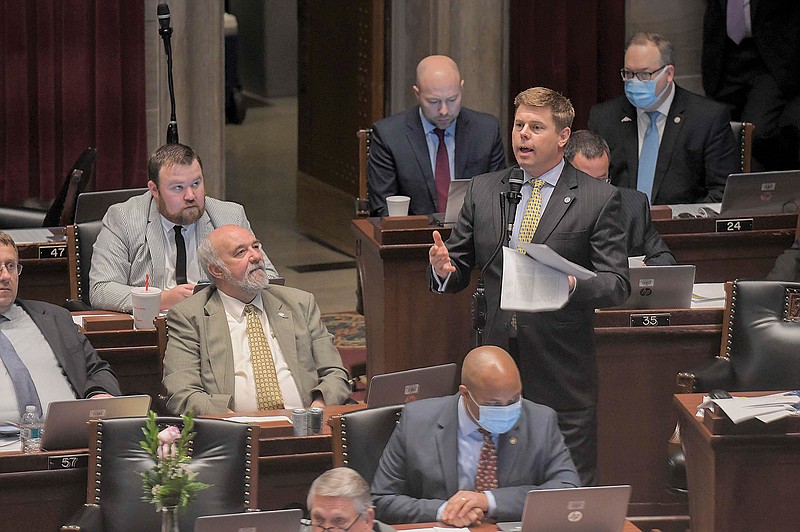Missouri lawmakers had pre-filed 600 pieces of legislation between the state House and Senate for the spring session, as of Friday morning - the end of the first week of pre-filing, which opened Dec. 1.
Some of that legislation is in direct response to the COVID-19 pandemic and calls for police reform, while other bills are attempts to pass what the pandemic prevented from being voted on last spring.
Senators and senators-elect had filed 263 bills and 21 joint resolutions as of Friday morning, while representatives and representatives-elect had filed 298 bills and 18 joint resolutions.
Pandemic
Pre-filed bills in the Senate related to COVID-19 so far seemed to fall into two categories: resurrecting the liability protection legislation Gov. Mike Parson had called for in special session that ultimately fell apart and limiting public health authorities' powers.
Republican Sens. Bill White and Tony Luetkemeyer had pre-filed SBs 42 and 51, which would deal with health care, products and premises liability protections - three things Parson had requested.
The governor had expanded the second special legislative session this year to include a call for those three sets of liability protections. But, Senate action was delayed by COVID-19 infections, and then, Parson changed his mind about the legislation that was developed after new language in a committee substitute for it that he had not had time to review fell outside the scope of special session, he said last week.
"We were disappointed, to say the least, that we didn't get the COVID liability done," Parson said Thursday. He added he hoped it would be a priority come January.
Meanwhile, Republican Sens. Andrew Koenig and Bob Onder and Republican Senator-elect Rick Brattin pre-filed SBs 12, 21 and 67 - all seeking to limit the power of public health officials, including on restrictions for religious gatherings, the duration of public health restrictions, and the ability to limit the number of people allowed on private property.
A similar bill was pre-filed in the House by Rep. Jim Murphy, R-St. Louis.
Police reform
There were calls by lawmakers throughout 2020 for Parson to expand special sessions to include law enforcement reform, following the death in May of George Floyd in Minneapolis, other deaths such as Breonna Taylor and Ahmaud Arbery, and the widespread protests that followed.
Rep. Ashley Bland Manlove, D-Kansas City, who is chair-elect of the Missouri Legislative Black Caucus, pre-filed HB 280, which would bar police from using a chokehold - "a method by which a person holds another person by putting his or her arm around the other person's neck with sufficient pressure to make breathing difficult or impossible and includes, but is not limited to, any pressure to the throat or windpipe that may prevent or hinder breathing or intake of air" - unless the officer reasonably believed themselves or another person to be in danger that justified the use of deadly or seriously-injuring physical force.
The one-line bill summary specifically states carotid restraints and vascular immobility would also be prohibited.
Law enforcement officials have drawn distinctions between chokeholds - which limit airflow - and carotid or vascular restraints, which limit bloodflow.
Bland Manlove's bill would have an officer who is not justified in using a chokehold be subject to immediate dismissal and having their peace officer's license revoked.
Similar language is in HB 216, pre-filed by Rep. Justin Hill, R-Lake St. Louis, though without immediately including a specific consequence for using a chokehold without justification.
Hill's bill also deals with appeals of peace officer license discipline and would require applicants to law enforcement agencies to have a pre-employment screening looking for any history of disciplinary action.
His bill would also require officers to intervene and report to their supervisor if they think a colleague is using excessive force. Officers who do intervene would be protected from discipline or retaliation for intervening. Those who don't intervene when an internal investigation finds that they should have would be subject to discipline including possibly being fired.
HB 39, pre-filed by Rep. Kevin Windham, D-Hillsdale, would prohibit law enforcement agencies from contracting with public or private entities for training, unless the entity's instructors and curriculum have been approved by the state's Peace Officer Standards and Training Commission.
Sen. Brian Williams, D-University City, pre-filed SB 60. His law enforcement reform bill contains provisions including ones that would criminalize the unjustified use of a chokehold, limit the use of no-knock warrants, change use of force standards, criminalize sexual conduct with someone in an officer's custody, limit the use of chemical agents, prohibit the receipt of certain military equipment such as armored drones and armored vehicles, and require agencies to report all complaints of use of excessive force to the state attorney general.
Local lawmakers' bills
Mid-Missouri lawmakers - Republican Sens. Mike Bernskoetter and Jeanie Riddle and Republican Reps. Rudy Veit, Travis Fitzwater and Sara Walsh - had together pre-filed 29 bills.
Some - such as Bernskoetter's SB 36 that would establish a tax credit for supporting the repair and maintenance of Missouri Capitol complex buildings, or Riddle's SB 91 that would prohibit convicted sex offenders from being within 500 feet of children's athletic complexes or fields - are topics from the spring 2020 session that never made it through that session.
Other bills pre-filed by local lawmakers include ones that would establish a tonnage fee for the sale of anhydrous ammonia; regulate the use of electric bicycles; create a fund to reimburse counties for the costs of sequestering jurors in a capital case from another county; allow school districts to divide into subdistricts; require schools to offer computer science courses; and allow for restitution to be paid in cases of election campaign yard signs being destroyed.
Rep. Dave Griffith, R-Jefferson City, had not pre-filed any bills.

